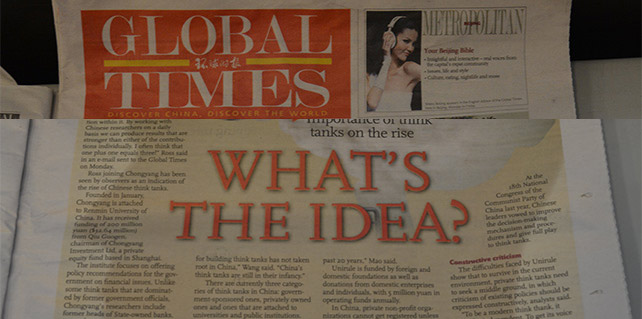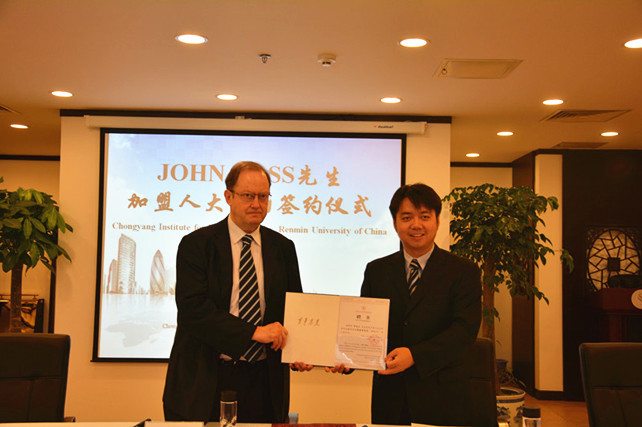
《环球时报》英文版6月7日发表题为《中国智库崛起的重要性》的深度报道特稿

6月1日上午,前英国伦敦经济与商业政策署署长罗思义正式加盟中国人民大学重阳金融研究院。图为签约仪式上罗思义与王文院长合影。
导读:《环球时报》英文版6月7日发表题为《中国智库崛起的重要性》的深度报道特稿,认为“罗思义加盟人大重阳标志着中国智库的崛起”。文章在开篇就介绍了人大重阳,称:“不同于以往那些只有前任政府官员组成的智库,人大重阳金融研究院的研究团队包含了金融界高层,学术精英及企业高管等。”
原题:中国智库崛起的重要性
记者:宋胜霞
翻译:刘宇佳
6月1日,前英国政府官员罗思义(JohnRoss)加盟中国人民大学重阳金融研究院,成为中国智库首位高官级的全职外籍高级研究员。罗思义于2000年至2008年期间,担任英国伦敦经济与商业政策署署长,职位相当于中国一市的副市长。在其任职期间,主要负责伦敦大型基础设施项目的经济谈判和城市的战略推广及营销工作。
罗思义在接受环球时报记者采访时说道:“我十分了解国际经济形势及中国在其中所处的位置。每天与中国的专家学者们一起工作,相比孤军奋战而言,我们的研究成果将更加深入。我始终相信一加一能创造出比二更大的效果。”
罗思义加盟中国人民大学重阳金融研究院,标志着中国智库的崛起。
中国人民大学重阳金融研究院成立于2013年1月19日,是由私募公司——上海重阳投资管理有限公司董事长裘国根校友的两亿元人民币(即3,264万美元)捐赠建立的。
中国人民大学重阳金融研究院致力于为国家和政府提供金融决策建议。不同于以往那些只有前任政府官员组成的智库,人大重阳金融研究院的研究团队包含了金融界高层,学术精英及企业高管等。
据宾夕法尼亚大学有关全球智库的一篇报道得知,截止2012年中国共拥有429所智库,仅次于美国。然而,中国智库并没有位居全球顶级智库榜单之中。中国最具权威的中国社会科学院(CASS)在全球150强智库中也仅位于第十七位。
智库在政策制定中发挥着日益重要的作用
咨询公司是依据客户需求,有偿开展相关课题的研究。但智库是为政策制定者提供建议的非营利性机构,通常主要涉及有关对外关系,国际事务,经济等其它对社会有意义的研究。
“中国目前的公共政策绩效评估和绩效责任制度尚不完善,政策制定常伴有随意性和主观性因素。”国务院发展研究中心(DRC)研究员王继承说。
“目前政策咨询的需要并不强烈,中国智库的建立尚未打牢根基,仍处于婴儿期的发展阶段。”王继承说。
目前中国的智库分为三类:政府赞助型,私有型以及依附于大学及公共机构的智库。
政府赞助型有中国社会科学院,国务院发展研究中心,中国现代国家关系研究院(CICIR),这些智库紧贴决策制定者,极易影响政府政策的制定。但这些政府赞助型的智库也经常被指责缺乏创新,更被视作只为政府政策所服务的传播者和倡导者。“政府辅助的智库缺乏灵活性,难以将不称职的研究人员撤出系统。”国务院发展研究中心王继承说。
北京大学中国经济研究中心和布鲁金斯公共政策研究中心则是依附于大学的智库。一般由国外基金会和国际组织为其提供大量资金,研究人员通常由海外留学人才担任。
私有化智库直至最近才得以在为中国政策制定提供更广阔的视野中才“小荷才露尖尖角”。
代表私有化智库的北京天则经济研究中心成立于1993年,由中国社会科学院退休的茅于轼——因尖锐评判毛泽东而众所周知的争议性人物所领导。
“天则经济研究中心竟然可以在中国过去的这二十年中屹立不倒,这可真谓是奇迹。”茅于轼说。
天则每年五百万的运营资金是由国内外基金会赞助,国内企业及个人捐赠所组成。中国的私营非盈利性组织必须附属于政府机构,否则无法注册。由于没有一家政府机构愿意支持天则,天则被迫于2005年注册成为企业单位。
“为了能让智库繁荣发展下去,政府应将智库视作可以帮助其做出正确决定的组织。”茅于轼说。尽管困难重重,茅于轼仍然对中国智库的未来充满信心。据他介绍,天则对包括土地和财产权在内的很多话题都做出过研究报告,成功影响了很多政策的制定。
“在改革开放的过去三十年里,中国已经解决了人们的温饱问题。下一阶段,人们将致力于发展问题。”中国战略智库(CSTT)秘书长田云说。“随着中国在全球的影响力加大,领导层在做出决策时也越来越愿意接受其他外部建议,也更趋向于通过智库帮助来寻求制定更加合理化的政策。”田云说。
去年十八大会议中,中国领导层许诺将改善政策制定机制和流程,充分发挥智库的作用。
建设性批评
从天则面临的问题中可以看出,私营智库若想要在目前的环境中发展下去,就要找到中间平台,对现存的政策做出有建设性的批评。
“作为现代化智库,一定是要独立的。对公众问题要有独到的见解,推出的政策建议也要切合实际,只有这样,他们的观点才能被大家所接纳。”中国战略智库田云说。
中国战略智库声称其完全独立于政府,但实际隶属于中国最高经济计划机构国家发展和改革委员会的下属网站——中国宏观经济信息网。
在美国这样的发达国家中,独立于政府被人们视作有公信力的象征。
据田云所说,中国战略智库并非由国家资助,而是由商业企业资助的。
“中国战略智库是非盈利性机构,我们需要资金去宣传我们的报告,吸引政策制定者的眼光。”田云说。
“仅仅通过拥护或是批判现有政策的智库难以建立名声。人们应当建设性地批评现有政策而非彻底否认。”人大重阳金融研究院高级研究员罗思义说。
《环球时报》英文版原稿
What`s the idea?
Importance of think tanks on the rise
By Song Shengxia
On June 1, John Ross, a former UK government official, signed with Beijing-based Chongyang Institute for Financial Studies (CIFS), a new think tank in China, to become the first foreign full-time senior fellow at a Chinese think tank.
Ross ran London`s economic and business policy in a position equivalent to the Chinese position of vice mayor between 2000 and 2008. In London, he led financial negotiations on large infrastructure projects and marketing for the city.?
"I know a great deal about the international economy and China`s position within it. By working with Chinese researchers on a daily basis we can produce results that are stronger than either of the contributions individually. I often think that one plus one equals three!" Ross told the Global Times.
Ross joining Chongyang has been seen by observers as an indication of the rise of Chinese think tanks.
Founded in January, Chongyang is attached to Renmin University of China. It has received funding of 200 million yuan ($32.64 million) from Qiu Guogen, chairman of Chongyang Investment Ltd, a private equity fund based in Shanghai.
The institute focuses on offering policy recommendations for the government on financial issues. Unlike some think tanks that are dominated by former government officials, Chongyang`s researchers include former heads of State banks, academic researchers and business executives.
According to a report on global think tanks published by the University of Pennsylvania in January, there were a total of 429 think tanks in China by the end of 2012, the second highest after the US.
However, Chinese think tanks are not yet among the most highly ranked. The Chinese Academy of Social Sciences (CASS) had the highest ranking among Chinese think tanks according to the report, ranking 17th in the global top 150.
Growing role of think tanks
Unlike consulting firms, which are paid to research particular topics at the request of their clients, think tanks are non-profit organizations that provide recommendations for policy makers. Their research agendas usually focus on foreign relations, international affairs, economics and other issues that have social significance.
"In China, public policy performance evaluation and accountability systems are not yet in place. It is common for the process of policy-making to be arbitrary and subjective," said Wang Jicheng, a researcher with the Development Research Center (DRC) of the State Council.
"So the need for policy consulting is not strong and the general climate for building think tanks has not taken root in China. China`s think tanks are still in their infancy," Wang said.
There are currently three categories of think tanks in China: government-sponsored ones, privately owned ones and ones that are attached to universities and public institutions.
Government-sponsored think tanks such as CASS, DRC and the China Institute of Contemporary International Relations (CICIR), are close to decision makers and therefore are more likely to influence government policies.
But they are often criticized for having a lack of innovation and accused of merely serving as interpreters and advocates of government policies.
"Government-backed think tanks lack flexibility. It is difficult to remove unqualified researchers from the system," said Wang at DRC.
Think tanks attached to universities include the China Center for Economic Research at Peking University and Brookings-Tsinghua Center for Public Policy. They receive significant funding from foreign foundations and international organizations and are often staffed with returnees from overseas.
Until recently, private think tanks have been marginal players in China`s wider landscape of policymaking.
Beijing-based Unirule Institute of Economics, a representative body for private think tanks, was founded in 1993. It is headed by Mao Yushi, a retiree from CASS and a controversial figure known for his sharp criticism of Mao Zedong.
"It`s a miracle that Unirule Institute of Economics has survived the harsh environment in China over the past 20 years," Mao said.
Unirule is funded by foreign and domestic foundations as well as donations from domestic enterprises and individuals, with 5 million yuan in operating funds annually.
In China, private non-profit organizations cannot get registered unless they are attached to government agencies.
Unable to find a government agency willing to support it, Unirule was forced to register as an enterprise in 2005.
"To allow think tanks to flourish, the government should convince itself that the function of think tanks is to help the government make the right decisions," Mao said.
Despite the restrictions, Mao said he was still optimistic about the future of China`s think tanks. According to Mao, Unirule has produced many research reports on topics including land and property rights that have successfully influenced policy decisions.
"During the past 30 years of opening-up and reform, China has solved the problem of feeding its people. The focus of the next stage will be on development," said Tian Yun, secretary-general of China Strategic Think Tank (CSTT).
"As China`s?global?influence?keeps?growing, the leadership is more open to outside ideas in decision making and tends to seek more rational policies through the support of think thanks," Tian said.
At the 18th National Congress of the Communist Party of China last year, Chinese leaders vowed to improve the decision-making mechanism and procedures and give full play to think tanks.
Constructive criticism
The difficulties faced by Unirule show that to survive in the current environment, private think tanks need to seek a middle ground, in which criticism of existing policies should be expressed constructively, analysts said.
"To be a modern think thank, it has to be independent. To get its voice heard, it has to have sharp insights into public issues and their policy recommendations have to be practical," said Tian from CSTT.
CSTT claims to be totally independent from the government but it is affiliated to the China Macroeconomic Information Network, a website attached to the National Development and Reform Commission, China`s top economic planner.
In developed economies such as US, independence from the government is regarded as a symbol of credibility.
According to Tian, CSTT does not receive any funding from the government, and is financed by businesses.
"We don`t make money from CSTT and we have to spend money to get our reports noticed by decision makers," Tian said.
"I do not believe a think tank can build a reputation only by supporting existing policies or criticizing existing policies," said Ross from CIFS.
"Disagreement with exiting policy should not be expressed destructively but constructively," Ross noted.